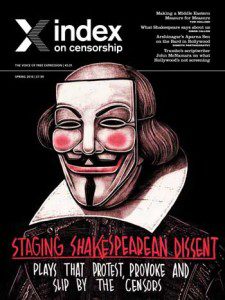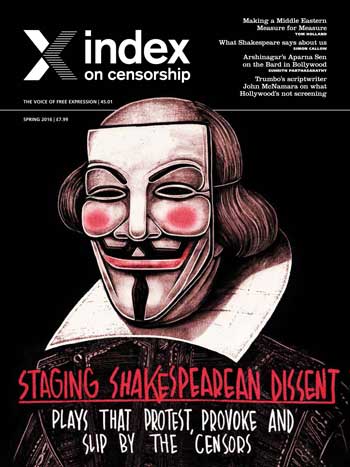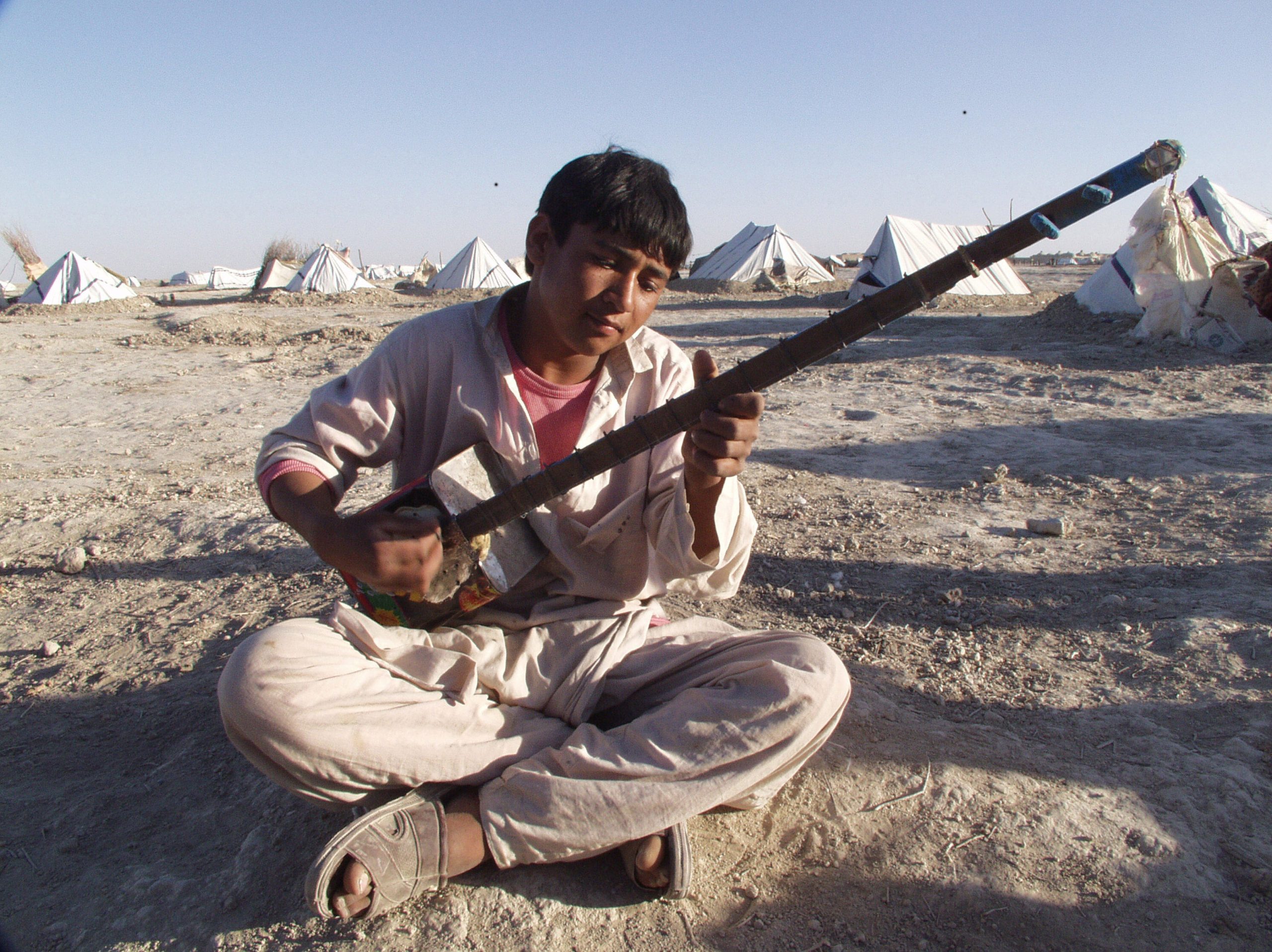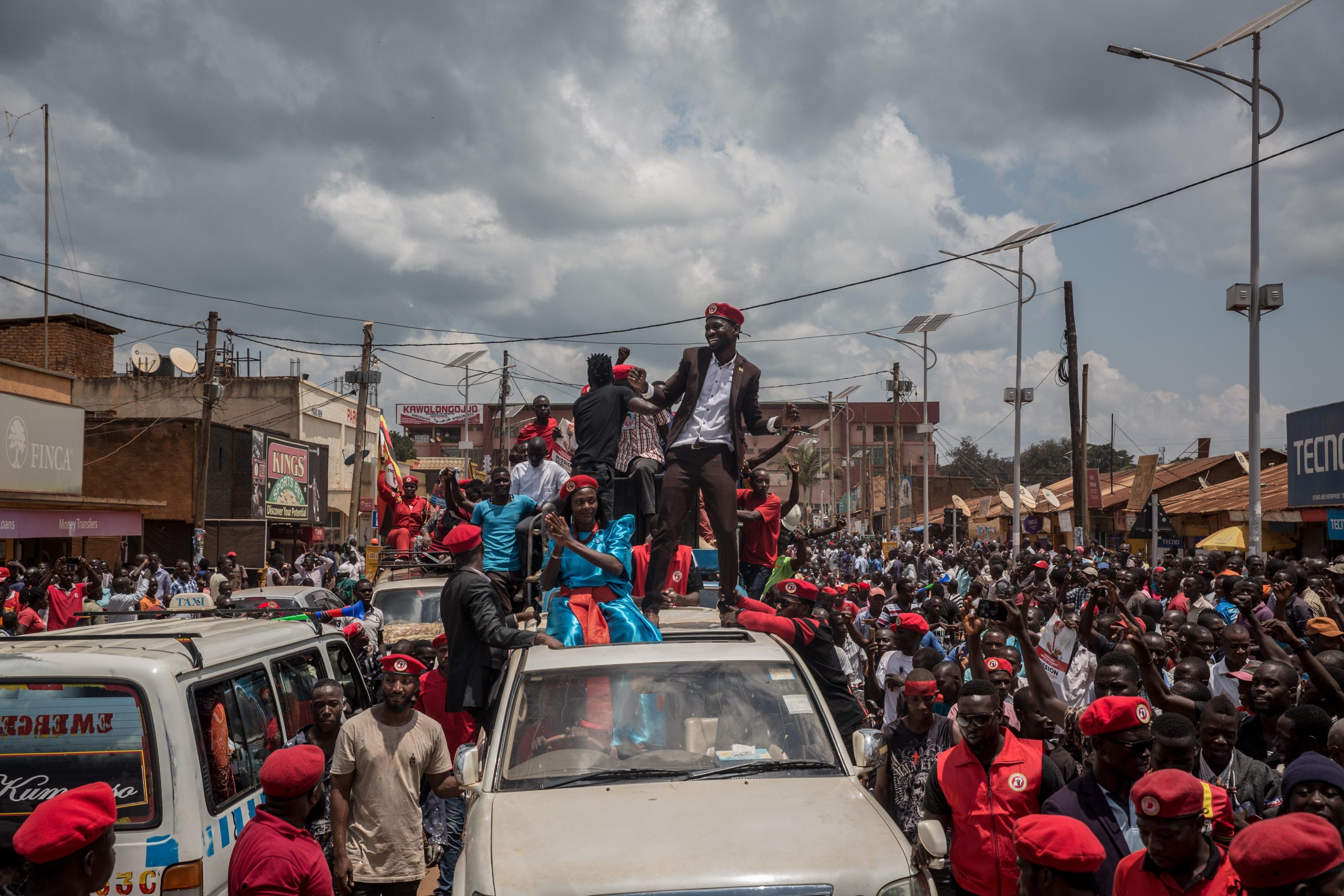
Order your copy of the Staging Shakesearean dissent here.
Order your copy of Index on Censorship here
To mark the release of the spring 2016 issue of Index on Censorship magazine Index has compiled a reading list of articles from the magazine archives covering the censorship of theatre. The latest issue, Staging Shakespearean Dissent, takes a look at how Shakespeare’s plays have allowed directors to tackle issues that would have otherwise been censored in countries around the world.
August 1982 vol. 11 no. 4
Performances of South African play Egoli, by writer Matsemela Manaka, went ahead at a Johannesburg theatre without being censored, yet the printed version – an extract of which is featured in this article – was banned. Egoli, which means “city of gold”, focuses on the plight of migrant mine workers in South Africa. Its two characters, John Moalusi Ledwaba and Hamilton Mahonga Silwane, were in prison at the same time: one for a political crime, the other for rape and murder. Now they work in the gold mines, while their families attempt to farm in the “homelands”.
Read the full article here.
March 2015 vol. 44 no. 1
Lucien Bourjeily’s 2013 play Will It Pass or Not? was banned by Lebanon’s censorship bureau, yet his 2015 play For Your Eyes Only, Sir was approved after some minor changes, despite the play including scenes from its banned prequel. Aimée Hamilton talks to Bourjeily about why his new play escaped the censors when his previous one didn’t, and what inspired it; and For Your Eyes Only, Sir is translated into English for the first time for Index on Censorship magazine.
Read the full article here.
July 1979 vol. 8 no. 4
Despite government assurances that it was lifting restrictions on Brazilian stage productions in April 1979, theatres were among the most censored over the next decade. Every play had to be submitted to the censor in Brasilia before it was staged, and a complete rehearsal had to take place in the presence of a censor of the town in which the play was being performed. In December 1978 one of Brazil’s best know playwrights Plínio Marcos, notorious for having 18 of his works suppressed without performance, wrote the play Oh! How I Miss the Termite to be read only, believing he could not get the play performed publicly.
Read the full article here.
November 1986 vol. 15 no. 10
In an interview with Czech exile Karel Hvizdala, for inclusion in a book of interviews he was working on, Czechoslovakian playwright Vaclav Havel, who was unable work in his profession in his own country – where nothing he had written had been published or performed since 1969 – speaks about his latest plays Largo Desolato and Temptation.
Read the full article here.
February 1985 vol. 14 no. 1
Karel Kyncl tells the story theatre and film actress Vlasta Chramostová, her Living Room Theatre, and how Shakespeare was used as a form of resistance. In the 1960s and 70s Czechoslovakian actors put on performances of Macbeth in houses, which they called Living Room Theatre. However, Shakespeare was seen as an enemy of socialism by Czechoslovakia police, who began to harass the actors. The actors continued to perform despite pressure from the police but eventually some of these actors were driven into exile.
Read the full article here.
May 2005 vol. 34 no. 2
Janet Steel discusses the censorship Gurpreet Kaur Bhatti faced when the British-Pakistani playwright attempted to put on her production Behzti at the Birmingham Repertory Theatre. The local Sikh community called for the play to be banned, stating it incited racial hatred, which led to Bhatti receiving threats because of her work.
Read the full article here.
Nan Levinson: Bowdler revisited
March 1990 vol. 19 no. 3
Nan Levinson discusses censorship of Romeo and Juliet in textbooks in American schools. Artist Janet Zweig read an article written by a student about the discrepancies between the play in his school textbook and the version he saw on stage. Over 300 lines had been cut from the play, the majority of which contained sexual references. Zweig spoke to publishers and found the publishers that didn’t cut lines from the textbook didn’t sell as many as those who did. She went on to make a book from the 336 lines that were cut from the textbooks, part of which is featured in this article.
Read the full article here.
Dame Janet Suzman: Stage directions in South Africa – June 2014 vol. 43 no.2
Dame Janet Suzman’s 1987 production of Othello in South Africa caused a huge amount controversy due the production showing a relationship between a black man and a white woman during the apartheid. Many people left the production in protest and sent threatening letters, however the play escaped being banned or censored because it was Shakespeare. In this article Suzman discusses why she chose to put on such a controversial production and how through Shakespeare they escaped the censors.
Read the full article here.
November 1998 vol. 27 no. 6
The long awaited revival of a 400-year-old classical opera, in rehearsal at Shanghai’s Kunju Theatre, was called off by the Shanghai Bureau of Culture. It accused the director of introducing “archaic, superstitious and pornographic” elements into his production and vetoed its export first to New York and subsequently to France, Australia and Hong Kong. Mu Dan Ting, (Peony Pavilion), had not been performed in its entire act since it was written by Tang Xianzu in 1598 during the Ming Dynasty, as it was written out of classical repertoire under the communists. However director Yang Lian believes this time round its banning has more to do with political manoeuvering than the nature of the opera itself.
Read the full article here.
August 1980 vol. 9 no. 4 23-28
“Censorship in the theatre has always been more petty and strict than censorship in general – that of literature, for instance. Sadly, it has often been the finest examples of Russian drama that have not reached the stage until several years – sometimes decades – after they were written.” Anna Tamarchenko discusses the censorship of Russian theatre throughout the years.
Read the full article here.
Order your copy of Index on Censorship here or take out a digital subscription via Exact Editions (just £18 for the year, with a free trial).













